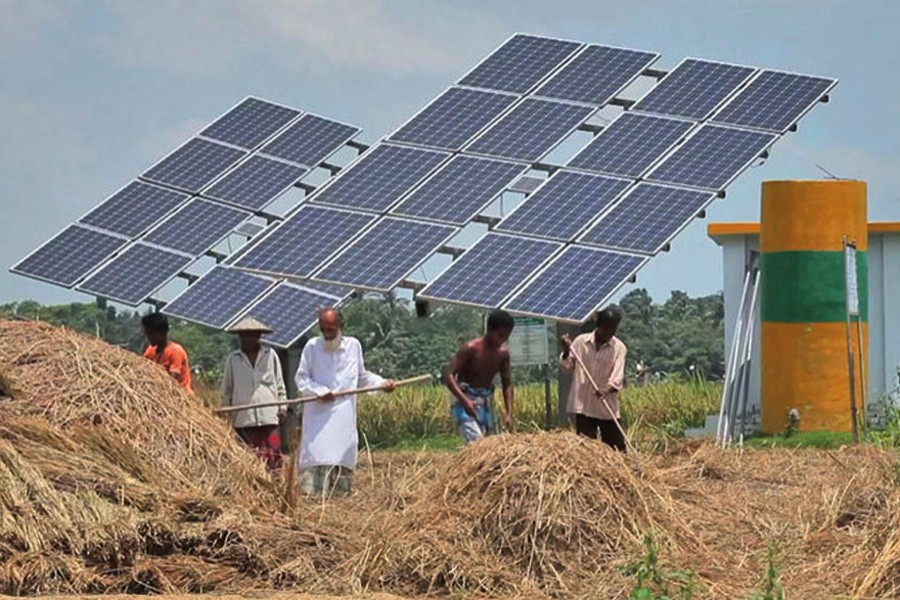Electricity coverage through Solar Mini Grid Project (SMGP) in hard-to-reach river islands (chars) have been improving the lives of char people as well as fuelling the local economy.
The state-run Infrastructure Development Company Ltd (IDCOL) has been implementing such SMGPs through its partner organisations in remote char areas across the country.
The objective of SMGP is to provide grid quality electricity to households and small commercial users and thereby encourage commercial activities in the project areas.
"IDCOL has already approved 27 solar mini-grids of which 17 are in operation in the country's remote rural areas," said IDCOL executive director & CEO Mahmood Malik.
IDCOL that bankrolls renewable energy projects in the country has set a target to establish 200 solar mini-grid projects by 2025 where grid electricity may not be expanded within next five to ten years, he added.
With these 200 mini-grids, nearly 200,000 households, social and commercial enterprises will be brought under grid-quality and low-emission electricity services.
He also said the cumulative capacity of these projects will be 50 MWp and during the project tenure, these will reduce 347,040 tonnes of carbon dioxide emission by replacing 144,000 tonnes of kerosene consumption by these households.
IDCOL through its partner organisation Solargao Ltd installed a 130 kWp (kilowatt peak) SMGP at Char Rupsha under Mesra union in Sirajganj Sadar upazila.
Visiting the project area, this correspondent saw many of the households and small businesses using electricity supplied by the SMGP.
Talking to the FE, Mohir Uddin, a resident of Char Rupsha said, "Previously, we used Solar Home System (SHS) to light our house at night. Only two lights and a fan could be run then."
Now, the household has a refrigerator, a colour television, two energy saving lights, three table fans and a water pump to meet the water demand for the cattle farm, he added.
In Rupsha Bazar, one and half kilometre from the plant, many of small traders use grid-quality solar power that reduces their electricity cost by almost half.
Mokaddes Ali Liton runs Bhai Bhai Studio that provides computer and internet related services, photocopying and photograph capturing and printing.
He said, "Earlier, I meet my electricity demand through a diesel generator that costs around Tk 3,500 to Tk 4,000 per month. Now the electricity bill came down to Tk 1,200 to Tk 1,500."
Besides, electric vehicles charged by mini-grid electricity are now available in the project areas, providing improved transport services to the local people.
The cost of the project was Tk 54 million of which IDCOL provided Tk 27 million in grant and Tk 16.2 million in soft loan and the rest Tk 10.8 million was invested by Solargao as equity.
Around 9.5 kilometres of the transmission line were also installed by Solargao under the project that will run for 20 years.
The SMGP which came into operation on February 28, 2017 provides uninterrupted grid quality electricity to 310 households and 164 small businesses in Char Rupsha.
Consumers pay their electricity bills using prepaid meters installed in their households or business organisations through mobile financial services (MFS) bKash.
Users need to pay Tk 2,500 for connections and prepaid meter charge while Solargao provides free wiring for up to 65 feet.
However, per unit electricity cost is Tk 20 for now which will be adjusted soon to Tk 30. It is much higher than that of national grid electricity.


